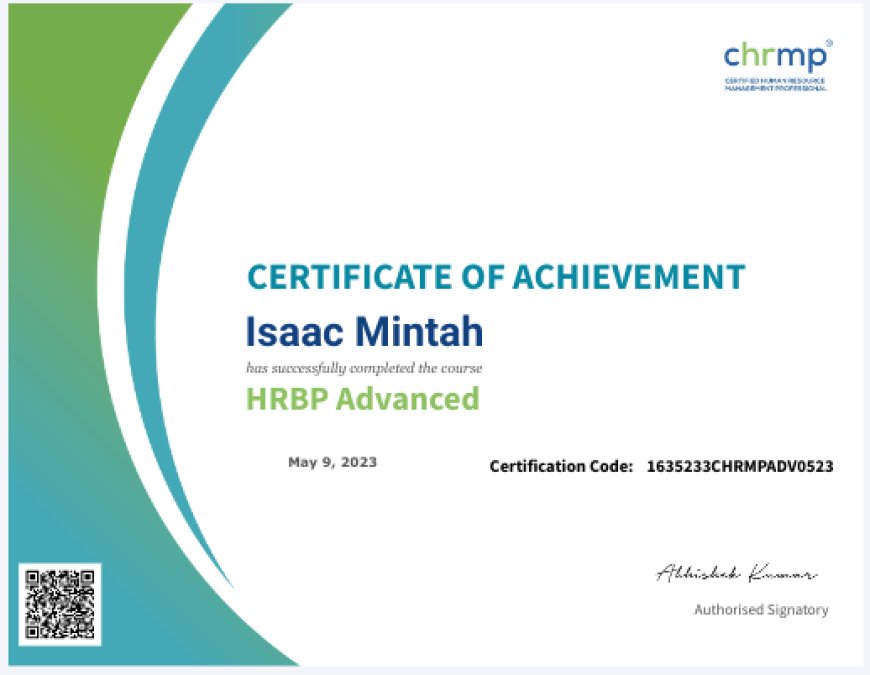Top Human Resources Certification Bodies and Their Credentials in 2024

Human Resources (HR) certifications have become essential for professionals looking to enhance their expertise, credibility, and career prospects in the field. Several respected organizations offer certifications tailored to different levels of HR experience and specialization, providing HR professionals with the skills they need to manage talent, improve organizational performance, and ensure compliance with labor laws.
Here’s a look at some of the top HR certification bodies and their key credentials in 2024:
1. HR Certification Institute (HRCI)
Founded in 1976, HRCI is one of the oldest and most respected certification bodies in the HR profession. It offers a range of certifications for professionals at various levels of their careers, from early-stage HR practitioners to senior-level executives.
Certifications:
-
Associate Professional in Human Resources (aPHR®):
This certification is ideal for individuals just starting their career in HR. It focuses on fundamental HR knowledge and is designed for entry-level professionals with little to no experience in the field. -
Professional in Human Resources (PHR®):
The PHR is for HR professionals who are involved in implementing HR programs and practices. It requires at least one year of experience and focuses on operational HR knowledge, including employee relations and talent acquisition. -
Senior Professional in Human Resources (SPHR®):
Aimed at senior HR professionals with at least four to seven years of experience, the SPHR focuses on strategic HR leadership, including policy development, workforce planning, and business management. -
Global Professional in Human Resources (GPHR®):
The GPHR is for professionals managing HR operations across multiple countries. It emphasizes global HR management, international labor laws, and cultural awareness. A minimum of two years of global HR experience is required.
2. Society for Human Resource Management (SHRM)
SHRM is the world’s largest HR membership organization, and its certifications are recognized globally. SHRM certifications are based on practical, real-world knowledge, focusing on competency and behavioral skills needed for HR success.
Certifications:
-
SHRM Certified Professional (SHRM-CP):
This certification is for early- to mid-career HR professionals who are engaged in implementing HR policies and programs. The SHRM-CP emphasizes operational roles in HR management, such as talent management, employee relations, and performance management. -
SHRM Senior Certified Professional (SHRM-SCP):
Designed for senior HR leaders, the SHRM-SCP focuses on strategic HR practices, including aligning HR goals with business objectives, leadership development, and organizational effectiveness. It is suitable for professionals with senior-level experience.
3. WorldatWork
WorldatWork specializes in certifications related to compensation, benefits, and total rewards. These credentials are designed for HR professionals who manage employee compensation and benefits programs within organizations.
Certifications:
-
Certified Compensation Professional (CCP®):
This certification is tailored for HR professionals who specialize in designing and administering compensation plans. It covers everything from job evaluation and pay structures to compensation law and strategy. -
Certified Benefits Professional (CBP®):
The CBP focuses on managing employee benefits programs, including health and welfare, retirement planning, and work-life benefits. It's a perfect fit for HR professionals responsible for overseeing benefits programs in their organizations. -
Global Remuneration Professional (GRP®):
The GRP is designed for HR professionals involved in global compensation and benefits. It addresses the complexities of managing compensation programs across multiple countries and helps HR professionals navigate international labor markets and tax regulations.
4. Talent Management Institute (TMI)
TMI is a leading global certification provider in the area of talent management. TMI certifications are focused on helping HR professionals excel in talent acquisition, development, and retention strategies.
Certifications:
-
Certified Talent Management Practitioner (CTMP™):
CTMP is for professionals with at least five years of HR or talent management experience. It focuses on the operational aspects of managing talent, including talent acquisition, workforce planning, and employee engagement. -
Senior Talent Management Practitioner (STMP™):
Designed for experienced HR leaders, the STMP certification covers advanced talent management strategies, including leadership development, succession planning, and organizational change management. -
Global Talent Management Leader (GTML™):
Aimed at global HR professionals, the GTML focuses on cross-border talent management, global talent acquisition strategies, and navigating the challenges of managing a diverse workforce across international markets.
5. Certified Human Resource Management Professional (CHRMP)
CHRMP is a globally recognized certification body that offers competency-based HR certifications designed to cater to different levels of HR professionals. Their focus is on providing practical HR knowledge that can be applied in day-to-day HR operations.
Certifications:
-
CHRMP Foundation:
This is an entry-level certification that equips aspiring HR professionals with fundamental HR concepts and practices. It is ideal for fresh graduates and individuals transitioning into HR roles. -
CHRMP Advanced:
Designed for HR professionals with three to seven years of experience, this certification focuses on developing expertise in strategic HR practices such as talent management, HR analytics, and leadership development. -
CHRMP Senior:
For senior HR leaders with extensive experience, this certification covers advanced topics like organizational development, HR business partnering, and strategic workforce planning. It prepares professionals for executive-level HR roles. -
CHRMP Talent Acquisition:
This specialized certification focuses on recruitment and talent acquisition, providing HR professionals with in-depth knowledge of sourcing, interviewing, and hiring the right candidates to meet organizational needs. -
CHRMP Analytics:
This certification helps HR professionals harness the power of data by focusing on HR analytics. It is designed to teach professionals how to analyze HR metrics and data to make informed decisions that drive organizational success.
6. International Public Management Association for Human Resources (IPMA-HR)
IPMA-HR focuses on public sector HR certification, catering to HR professionals working in government agencies at the local, state, and federal levels.
Certifications:
-
IPMA Certified Professional (IPMA-CP):
This certification is designed for mid-level HR professionals in the public sector. It covers core HR areas, including recruitment, employee relations, and labor law compliance, tailored to the public sector. -
IPMA Senior Certified Professional (IPMA-SCP):
Targeted at senior HR professionals in the public sector, the IPMA-SCP focuses on strategic HR management, including workforce planning, leadership, and policy development. It is suitable for professionals with experience in public-sector HR leadership roles.
Conclusion
HR certifications provide a structured path for career advancement, giving professionals the tools they need to navigate the complexities of the modern workplace. Whether you’re looking to specialize in talent management, global HR, or compensation and benefits, there’s a certification that aligns with your career goals. These certifications not only enhance your skills but also signal your expertise and commitment to the HR profession, helping you stand out in a competitive job market.









